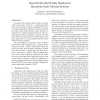123 search results - page 1 / 25 » Abstracting out Byzantine Behavior |
67
Voted
DAGSTUHL
2006
15 years 3 months ago
2006
107
click to vote
EDM
2008
15 years 3 months ago
2008
Students can use an educational system's help in unexpected r example, they may bypass abstract hints in search of a concrete solution. This behavior has traditionally been la...
111
click to vote
NSDI
2007
15 years 4 months ago
2007
Byzantine fault tolerant systems behave correctly when no more than f out of 3f + 1 replicas fail. When there are more than f failures, traditional BFT protocols make no guarantee...
124
Voted
OPODIS
2010
15 years 11 days ago
2010
: Provide application processes with strong agreement guarantees despite failures is a fundamental problem of fault-tolerant distributed computing. Correct processes have not to be...
142
click to vote
SAGT
2009
Springer
15 years 9 months ago
2009
Springer
Abstract. A mechanism is manipulable if it is in some agents’ best interest to misrepresent their private information. The revelation principle establishes that, roughly, anythin...

